The Azores Travel Guide
The remoteness of the archipelago of the Azores in the North Atlantic has saved the beautiful green islands from becoming overdeveloped. International flights do make their way to the Azores, which lie 900 miles west of Portugal. But as of yet, tourism has not spoilt the islanders' traditional way of life nor marred the magnificent natural attractions, including the geysers at Lagoa das Furnas or the white sand beaches of Lagoa da Fogo.
Those who visit soon manage to drop the words 'stress' and 'pollution' from their vocabularies, and give in totally to enjoying the islands' year round subtropical climate with mild temperatures and high humidity. The only concern that might arise is the odd earth tremor: the islands are rather geologically unstable and pitted with volcanoes and hot sulphur springs. The 250,000 inhabitants seem unperturbed by this, however, and go about their daily rounds much as their forefathers did hundreds of years before.
The daily business is generally agricultural labour. The Azores is characterised by large tracts of farmland, sprinkled with little settlements of whitewashed houses. The gently sloping hillsides are carpeted with vineyards and fruit orchards. The coast of the islands is, in the main, rather rugged, but there are bays and inlets for swimming and sunbathing with the odd stretch of white sand. Island hopping is simple to achieve because all the islands are connected by ferry and local air services.
Things to do in The Azores
The nine volcanic islands of the Azores archipelago offer up a variety of things to see and do for travellers to its shores. With hundreds of resorts, the year-round warmth certainly suits the sun-loving visitor as they are never far away from a beautiful beach on which to laze.
On popular resort island São Miguel, there are endless activities and sights for the traveller to explore: mountain biking, golfing on world-class courses, horse-riding on the beach and whale watching from a boat cruise. Ponta Delgada on São Miguel makes a good base from which to explore the other eight islands of the Azores.
The town of Ponta Delgada has a variety of cultural sights such as a bustling town square filled with markets, the charming Chapel of Nossa Senhora da Esperanca, and a harbour boasting the imposing fortress of São Brás. From this base, which has its own airport chartering international flights, one can explore the surrounding islands, such as the picturesque Graciosa, sporting stunning turquoise waters and a pale white landscape. Alternatively, one can visit the historic centre of Terceira's capital town, Angra do Heroísmo, which has been classified as a UNESCO World Heritage Site.
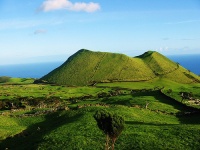
Pico
The resort island of Pico is dominated by its volcanic namesake, rising from the middle of the landscape and towering 7,720ft (2,351m) above sea level. It's the highest peak in Portugal, with a single road encircling the island following the rugged coastline. It's possible to climb the volcano to the summit but the route is arduous and should not be attempted by amateurs. Pico's other main claim to fame is as a jumping-off point for whale-watching expeditions, offered by local boatmen. In the island's vineyards, the famous verdelho wine grapes are grown. At Lajes, there is a whale-hunting museum and in São Roche, visitors can discover a museum depicting the operation of a whaling factory.
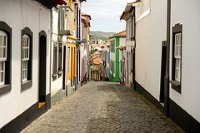
Terceira
Terceira, an island resort destination in the Azores, holds many places of interest for tourists. The historic centre of its capital town, Angra do Heroísmo, is classified as a UNESCO World Heritage Site. The town is an idyllic setting, renowned for its pastel-coloured sunset vistas and its periodic running of the bulls. Ask in the local bar when the next event is likely to take place. The other main town on the island, Praia da Vitória, is interesting because of its American flavour, being close to the American airbase in Lajes and featuring several burger joints and US-style souvenir shops.
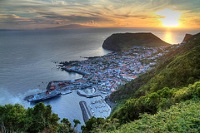
São Jorge
The resort island of São Jorge is surrounded by sheer black cliffs and is the centre of the Azores' dairy industry. The lush green grass of the island's fields plumps up the grazing cows, who in turn produce rich milk for creamy, straw-coloured wheels of cheese. The island also has exclusive rights to the delicious fleshy cockles that are caught in the waters of Caldeira de Santo Cristo. Aside from its gastronomic delights, São Jorge offers active pursuits like dive fishing, hiking, swimming and bird watching. Villages such as Velas and Manadas possess historic buildings dating back to 1400 and offer the sleepy culture of traditional harbour towns.
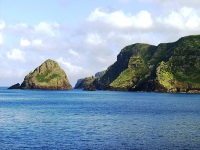
Santa Maria
The island resort of Santa Maria, a fantastic holiday retreat, lies southwest of São Miguel Island and features an airport that was a World War II American Air Force base, now appropriated as a civil airport. The main town on the island is Vila do Porto. It only has one hotel but also several inns and private villas for rent. There are a few sandy golden beaches on the island, including Praia Formosa, and the scenic Maia and São Lourenço Bays, offering rocky cliffs and attractive vineyards. Pretty villages like Anjos and Santo Espírito are steeped in local history and culture, and the island has many colourful festivals throughout the summertime.
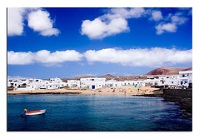
Graciosa
The tiny Graciosa is known as the White Island of the Azores due to the pale rocky landscape. But there is variety in its golden wheatfields and green and purple vineyards. The landscape is dotted with quaint Dutch-style windmills, and most of its 4,600 inhabitants make their living from farming, winemaking and cattle-raising. Graciosa has its own unique natural attraction: the Furna de Enxofre. This is a small, warm sulphur lake, concealed in a grotto underneath a volcanic crater. Visitors on holiday can reach the lake via a 270ft (80m) spiral staircase enclosed in a brick tower.
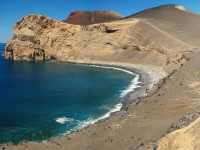
Faial
Faial, with its sheltered bays and immense volcanic crater, is the most visited of the Azores. Much of the interior is protected as a reserve where visitors enjoy the diverse flora and fauna under the supervision of local guides. Faial's main town, Horta, has a large marina used as a favoured stopping point for yachtsmen, and the harbour also occasionally accommodates cruise liners. Horta and other villages have a number of pretty churches, chapels, towers and forts, and a lively small-town atmosphere. Of interest to sightseers is the new section of land, covering an area of approximately one mile (two km), added to the island in the most recent volcanic eruption of 1957.
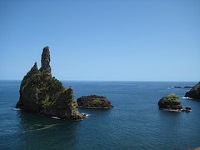
Flores
Literally the island of 'flowers', this most northerly of the Azores blooms, carpeted with numerous flowers among impossibly green hills and white-washed villages. Considered one of the most beautiful islands in the Azores, the best time to visit is summer, when it is covered in the bright pink and blue hydrangeas that give Flores its name. Highlights on the island include the seven serene lakes in volcanic craters, the Enxareus Grotto, the Águas Quentes hot springs and the multiple waterfalls of the Ribeira Grande. Flores' largest town, Lajes, is a picturesque fishing port set in green fields. All the island's towns and villages have historic chapels and churches to explore.
The Azores Climate and Weather
The Azores islands have a sub-tropical climate, characterised by high humidity and frequent fluctuations in weather patterns. The islands enjoy pleasant year-round temperatures with mild winters (January to March) and warm summers (July to September). The highest rainfall in the Azores archipelago is from October through to January.
Portugal travel info
Electricity
Electrical current is 230 volts, 50Hz. Round two-pin plugs are used.
Language
Portuguese is the official language, but English is widely spoken and understood.
Money
The official currency is the Euro (EUR), which is divided into 100 cents. There are numerous banks, bureaux de change and ATMs available in main cities and tourist destinations. Foreign currency can be exchanged at banks, bureaux de change and automatic currency exchange machines. Banking hours are generally 8.30am to 3pm Monday to Friday. Major credit cards are widely accepted.
Tipping
Service charges are not usually added to hotel and restaurant bills but it's customary to leave a 10 percent tip. Bar staff and taxi drivers also expect tips, which usually entails rounding up the bill to the nearest Euro.
Health
There are no health risks when travelling to Portugal. A yellow fever vaccination certificate is necessary for entry for anyone travelling from an infected area and destined for the Azores or Madeira. Health facilities are good and reciprocal health agreements exist with most European countries. It's advisable that travellers obtain a European Health Insurance Card (EHIC) before travel. Dental care and repatriation costs are not covered under this agreement, and travel insurance is therefore advised.
After Brexit, the Global Health Insurance Card (GHIC) replaced the European Health Insurance Card (EHIC) for UK citizens. The GHIC allows UK citizens access to state healthcare during visits to the EU.
Safety
Generally, safety is not a problem for travel in Portugal but reasonable care should be taken. Road maintenance is fairly poor so exercise caution and drive defensively when driving.
Local customs
Family is an important pillar of Portuguese society, with familial loyalty overriding everything, even in the corporate environment. Thus it's not uncommon for employers to hire family members as they feel comfortable around those they trust. Self-respect through appearance is also of high importance, with dressing smart for all occasions not a rare occurence. In terms of cuisine, the Portuguese love seafood as well as sweet treats like honey cakes and pasteis. As a nation which is predominately Roman Catholic and conservative, overly exuberant foreigners are frowned upon while lateness and informal etiquette is also considered rude.
Doing business
Business culture in Portugal observes a strict hierarchical top-down approach to management and leadership. Subordinate employees are expected to do as they are told. Strong business relationships are built on trust between colleagues, and personal connections are important.
Business etiquette is formal yet relaxed. Use titles such as 'Señhor' and 'Señhora' until strictly instructed not to do so, and show deference to those in obvious positions of authority. Business meetings in Portugal must be made by appointment.
The dress code in Portugal is strictly smart and formal - with a strong emphasis placed on presentation. Business hours in Portugal vary, but are generally from 8.30am to 1pm, and 3pm to 6pm, from Monday to Friday.
Duty free
Travellers over 17 years arriving from non-EU countries do not have to pay duty on 200 cigarettes, 100 cigarrilos, 50 cigars or 250g of tobacco; 4 litres of wine, 16 litres of beer and 1 litre of spirits over 22% or 2 litres of liquor less than 22% volume; 50g of perfume and 250ml of eau de toilette; other goods up to the value of €430 for air and sea travellers.
Communications
The international access code for Portugal is +351, and wifi is available in most hotels, cafes and restaurants throughout Portugal.
Passport & Visa
All visitors, except EEA member states, must hold tickets and documents for their return or onward journey, and proof of paid accommodation (equivalent in convertible currency accepted). The borderless region known as the Schengen area includes the following countries: Austria, Belgium, Czech Republic, Denmark, Estonia, Finland, France, Germany, Greece, Hungary, Iceland, Italy, Latvia, Lichtenstein, Lithuania, Luxembourg, Malta, The Netherlands, Norway, Poland, Portugal, Slovakia, Slovenia, Spain, Sweden and Switzerland. All these countries issue a standard Schengen visa that has a multiple entry option that allows the holder to travel freely within the borders of all. It is highly recommended that passports have at least six months validity remaining after your intended date of departure from your travel destination. Immigration officials often apply different rules to those stated by travel agents and official sources.
Entry requirements
US nationals do not require a visa for a stay of up to 90 days within a 180-day period. A passport valid for at least three months beyond period of intended stay is required.
UK nationals do not require a visa for a stay of up to 90 days within a 180-day period. A passport valid for at least three months beyond period of intended stay is required.
Canadians do not require a visa for a stay of up to 90 days within a 180-day period. A passport valid for three months beyond period of intended stay is required.
Australian nationals do not require a visa for a stay of up to 90 days within a 180-day period. A passport valid for three months beyond period of intended stay is required.
South African nationals require a passport valid for at least three months beyond period of intended stay, and a Schengen visa.
Irish nationals do not require a visa to visit Portugal. A passport valid on arrival is required.
New Zealand nationals do not require a visa for a stay of up to 90 days within a 180-day period. A passport valid for three months beyond period of intended stay is required.
Useful contacts
Institute of Portugal Tourism, Lisbon: +351 211 205 050 or www.visitportugal.com
112Embassies / consulates in other countries
Portuguese Embassy, Washington, United States: +1 202 350 5400.
Portuguese Embassy, London, United Kingdom: +44 207 235 5331.
Portuguese Embassy, Ottawa, Canada: +1 613 729 0883
Consulate General of Portugal, Sydney, Australia: +61 2 9262 2199
Portuguese Embassy, Pretoria, South Africa: +27 12 341 2340
Portuguese Embassy, Dublin, Ireland: +353 1 412 7040
Portuguese Consulate, Auckland, New Zealand: +64 9 255 2569
Embassies / consulates in Portugal
United States Embassy, Lisbon: +351 21 727 3300
British Embassy, Lisbon: +351 21 392 4000
Canadian Embassy, Lisbon: +351 21 316 4600
Australian Embassy, Lisbon: +351 21 310 1500
South African Embassy, Lisbon: +351 21 319 2200
Irish Embassy, Lisbon: +351 21 330 8200
New Zealand Consulate, Lisbon: +351 21 314 0780



